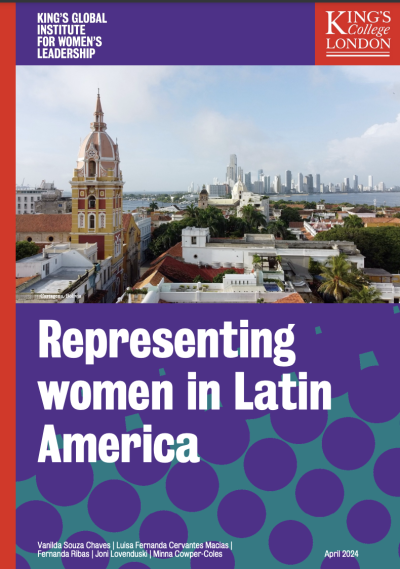
- Report year:2024
- Organisation: King’s Global Institute for Women’s Leadership
The report emphasises the presence of women in leadership roles, explores their identities, and assesses the opportunities, obstacles, and the impact they have in public office in Latin America.
Many Latin American countries have made tremendous leaps towards gender equality, this progress has not been equally shared across the region. Some countries have achieved gender parity, while others have less than 20 percent of women in public roles. And the progress that has been made tends to be centred more at the parliamentary level rather than in local government or executive roles. Further, for a region as diverse as Latin America, black and indigenous groups – and women in particular – are strikingly underrepresented.
Despite the progress, there are still major obstacles that women face in getting into and remaining in politics – such as socioeconomic inequalities, cultural and caring norms and political violence. Quotas – when properly set up – can go a long way in countering the effect of these disadvantages getting into power, but their effect can still impact women’s ability to effect change and take on more senior roles.
Women in politics in Latin America have played a crucial role in pushing for laws to increase gender equality through parity legislation, legalisation of abortion and tackling violence against women and girls.
Our overview shows that while there are many places where more evidence is needed to paint a fuller picture – such as in the representation of non-white Latin American women, and the policy impact of the women introduced through quotas – there are many reasons to be optimistic for the representation of women in Latin America and to seek to learn the lessons from this region to increase women’s political representation on a global level.
Many Latin American countries have made tremendous leaps towards gender equality, this progress has not been equally shared across the region. Some countries have achieved gender parity, while others have less than 20 percent of women in public roles. And the progress that has been made tends to be centred more at the parliamentary level rather than in local government or executive roles. Further, for a region as diverse as Latin America, black and indigenous groups – and women in particular – are strikingly underrepresented.
Despite the progress, there are still major obstacles that women face in getting into and remaining in politics – such as socioeconomic inequalities, cultural and caring norms and political violence. Quotas – when properly set up – can go a long way in countering the effect of these disadvantages getting into power, but their effect can still impact women’s ability to effect change and take on more senior roles.
Women in politics in Latin America have played a crucial role in pushing for laws to increase gender equality through parity legislation, legalisation of abortion and tackling violence against women and girls.
Our overview shows that while there are many places where more evidence is needed to paint a fuller picture – such as in the representation of non-white Latin American women, and the policy impact of the women introduced through quotas – there are many reasons to be optimistic for the representation of women in Latin America and to seek to learn the lessons from this region to increase women’s political representation on a global level.
